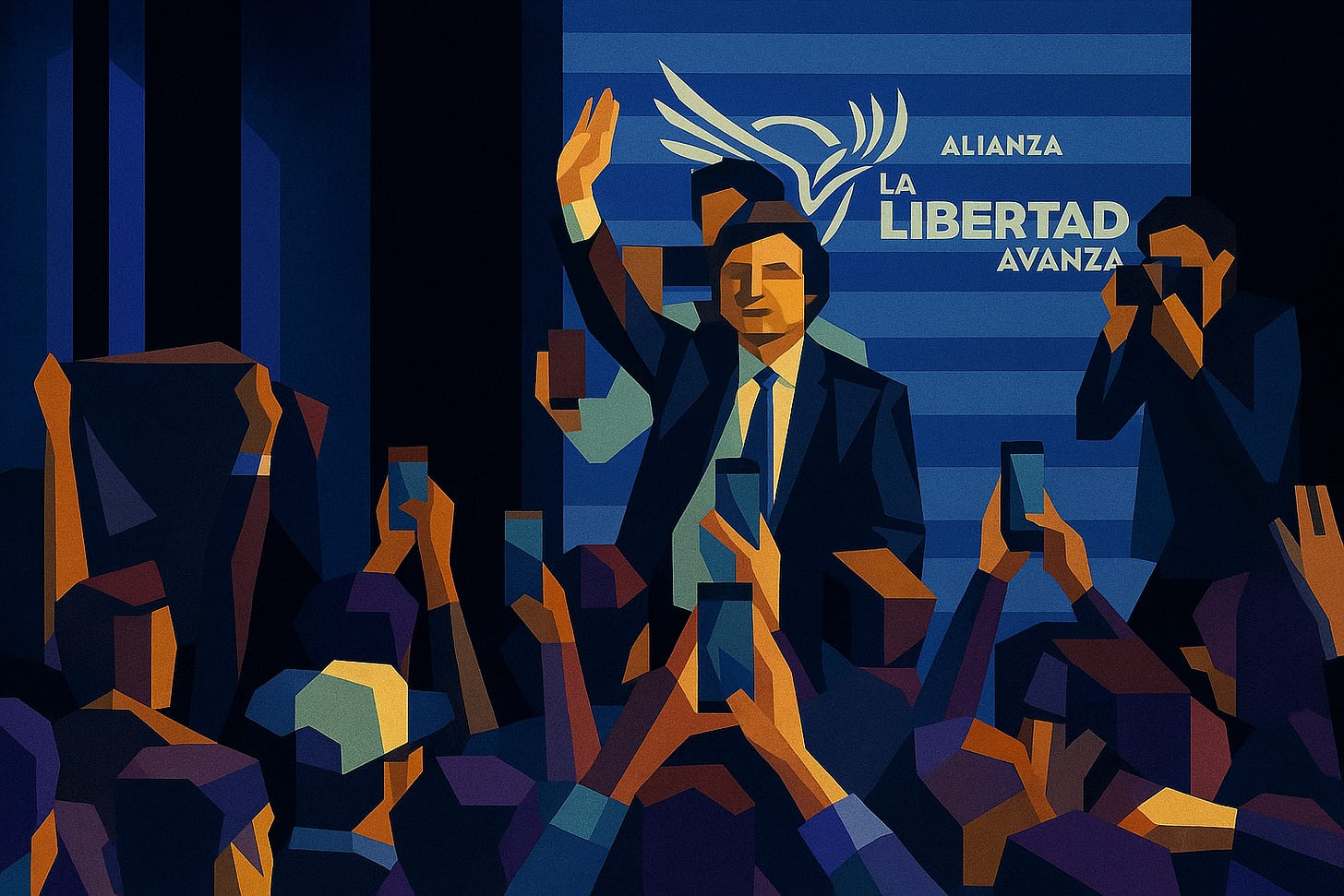Javier Milei’s second wind and why many mainstream commentators were wrong
What can we learn from Argentina's midterm elections?
In August I argued that Argentina’s swift recovery under Javier Milei should puncture South Africa’s fatalism. I wrote then that a slow sinking ship can be turned around, and that the barrier to reform is not legal or institutional so much as political will.
Milei took office in December 2023 and since then, we’ve had the spectacle of an orthodox media narrative turning hard against Milei particularly before Argentina’s midterm elections held last week. Many declared the end of the free-market experiment with the certainty of a weather report. As the peso wobbled and markets fluctuated, an establishment chorus formed, forecasting inevitable collapse and a comeuppance for market liberalisation.
When Milei started he moved fast. He slashed spending, shut whole ministries, scrapped price and rent controls, eased exchange restrictions, began unwinding tariffs and red tape, and pushed privatisations. He aimed for a balanced budget and treated his country’s economic crisis like a crisis. Many predicted these reforms would be doomed but, as early indicators improved, that consensus frayed.
Then came a sharp reminder of Argentina’s old vulnerabilities. A stock-market sell-off followed an exchange-rate scare, and the Milei went abroad seeking support. It looked, for a week, like the same old Argentina. Then came Washington’s currency backstop but the commentariat found fresh steam to declare Milei’s project finished.
But then Argentinian voters spoke, again. Milei’s La Libertad Avanza party topped the midterm vote, expanded its footprint in both legislative chambers, and with allied blocs secured the numbers to keep his reform agenda alive. And now we are left with a more interesting question than why many mainstream commentators were wrong. Why is Milei popular at all?
Why Milei Won
Let’s start with the obvious. He did the thing. Argentines have spent years drowning in regulatory paperwork, economic slump and cynicism. Milei went into office stating the country was in an emergency and then behaved as if that were actually true. He cut spending, eliminated departments, pruned regulations, and moved to reopen markets that had been sealed by decades of policymaking. In contrast politicians here in South Africa like to declare an emergency and then appoint a panel, commission or host a dialogue. The lesson from the Argentine Republic is that people respond to clarity of leadership, even when it hurts.
He also levelled with voters about the pain. The early effects of Milei’s reforms were rough. Inflation did not vanish overnight and jobs tied to the state shrank. Yet the direction of change became legible. Markets, for all their nerves, could see fiscal discipline and fewer regulatory barriers. Households, for all their frustration, could see rent controls eased and prices starting to behave like organic prices. The Argentinian public did not need perfection but simply to see that things are moving in the right direction. And right-track/wrong-track polling remains one of the most reliable leading indicators of how they’ll vote next. So the midterm elections results should not actually have been a surprise.
There is another ingredient that many of the commentariat underestimate. Milei’s ideological profile can look theatrical, but his governing method has been more practical than his critics admit. He fights, then he cuts deals. He talks like a purist, then reaches compromise. Many predicted that temperament and ideology would doom him. Instead he has governed like a minority reformer must, piece by piece, taking what he can get through a legislature where his party does not control a majority. That mixture of conviction and compromise is politics at its best. Argentines have seen strongmen who bypass institutions. Milei, for all the sound and fury, has used these institutions for his reform. This is a big lesson for South Africa where our future reformers will likely not have the luxury of electoral majorities. It can be done.
The pre-midterm-election narrative particular outside of Argentina insisted the noise was the story. But Argentinean voters insisted the progress being made was. That is why dire forecasts from abroad, including sly suggestions that Argentines would slink back to Peronism at the first sign of discomfort, landed with a thud.
Moreover, it appears that a further source of Milei’s appeal was his insistence that the state must do less and do the less better. South Africans understand the opposite all too well. We have a state that promises a great deal, funds a great deal, and delivers very little. We’ve normalised service delivery failures, stagnant growth, and a public sector wage bill that crowds out service. Many here praise the idea of reform as if talking about reform were reform.
What does it mean for SA?
So what does any of this mean for South Africa, where reform agendas read like a broken record. First, our fatalism is learned, not natural. We have taught ourselves that the hard things cannot be done, that the various vested interests will never allow it, that coalition chaos makes change impossible, that social stability depends on endless subsidies and grants we cannot afford. Argentina had versions of all these obstacles. South Africa could choose the same route of change.
Second, we should stop outsourcing political courage to the courts and to civil society. Both restrain abuse and preserve space for dissent and have been South Africa’s lifeline amidst state decay. But they cannot deliver growth or competence on their own. The core of a reform agenda is still political. Pick a few binding constraints and remove them at speed. Liberalise labour, get serious about ending cadre deployment, break the monopolies on rail and ports. None of this requires miracle laws. It requires taking the existing tools of a constitutional democracy and using them.
Thirdly, South Africa has normalised the ritual of accountability instead of accountability itself. Press conferences, hearings, task teams, and apologies are the moral currency of a politics that fears decisions. People can smell that fear and the Argentines did. Whatever one thinks of Milei’s manners or his friends abroad, his government has refused that ritual comfort. He has made choices and owned their costs.
Conclusion
None of this is a paean. The risks in Argentina remain high. The external support of the US creates dependencies and their political coalitions can easily shift. Most importantly austerity obviously hurts those with the thinnest margins the hardest. These tensions are real. But South Africans should resist the habit of assuming tensions are fatal. As Thomas Sowell famously said “There are no solutions. There are only trade-offs.” Politics is the art of managing these trade-offs, but many of our politicians shy away from admitting that perfect solutions don’t exist.
The lesson is not that South Africa needs its own Milei. We need our own seriousness. We need leaders who treat crisis like crisis, who tell us what it will cost, who choose a sequence and then stick to it. And we need to be willing to back painful change when we can see the line from sacrifice to future success.
More articles:
If you found this piece worthwhile, feel free to share it with someone who might appreciate it.
To get future essays delivered directly to your inbox, you can subscribe here:
I welcome thoughtful conversation—feel free to reach out on LinkedIn or follow along on Twitter.
An edited version of this article was published on BusinessDay. If you'd like to support my writing please subscribe and consider a pledge.
This cover image was created using Sora.






